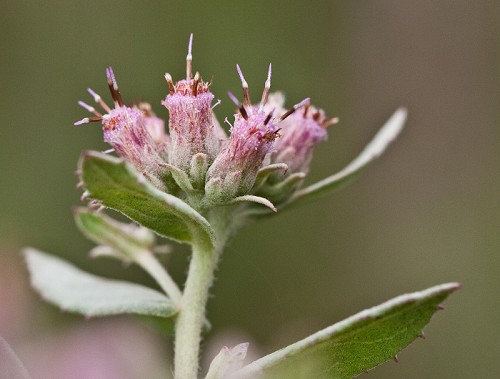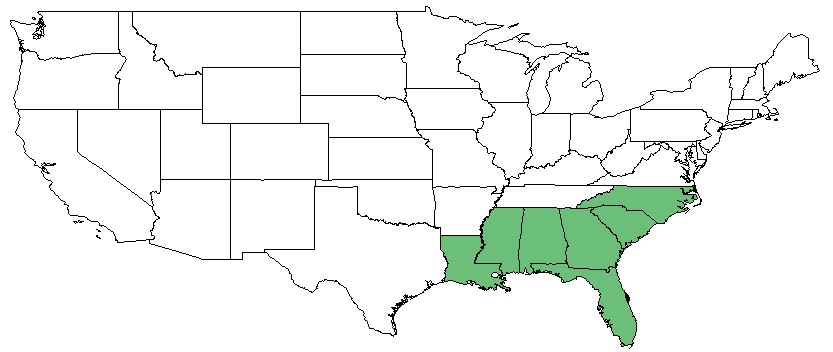Difference between revisions of "Pluchea baccharis"
(→Ecology) |
HaleighJoM (talk | contribs) (→Ecology) |
||
| (One intermediate revision by one other user not shown) | |||
| Line 38: | Line 38: | ||
<!--===Seed dispersal===--> | <!--===Seed dispersal===--> | ||
<!--===Seed bank and germination===--> | <!--===Seed bank and germination===--> | ||
| − | + | ===Fire ecology===<!--Fire tolerance, fire dependence, adaptive fire responses--> | |
| − | <!--===Pollination and | + | Populations of ''Pluchea baccharis'' have been known to persist through repeated annual burning.<ref>Platt, W.J., R. Carter, G. Nelson, W. Baker, S. Hermann, J. Kane, L. Anderson, M. Smith, K. Robertson. 2021. Unpublished species list of Wade Tract old-growth longleaf pine savanna, Thomasville, Georgia.</ref> |
| − | <!--==Diseases and parasites==--> | + | <!--===Pollination===--> |
| + | <!--===Herbivory and toxicology===<!--Common herbivores, granivory, insect hosting, poisonous chemicals, allelopathy, etc--> | ||
| + | <!--===Diseases and parasites===--> | ||
==Conservation, cultivation, and restoration== | ==Conservation, cultivation, and restoration== | ||
Latest revision as of 14:00, 15 July 2022
Common name: marsh fleabane [1], rosy camphorweed [2]
| Pluchea baccharis | |
|---|---|

| |
| Photo by John Gwaltney hosted at Southeastern Flora.com | |
| Scientific classification | |
| Kingdom: | Plantae |
| Division: | Magnoliophyta - Flowering plants |
| Class: | Magnoliopsida - Dicots |
| Order: | Asterales |
| Family: | Asteraceae |
| Genus: | Pluchea |
| Species: | P. baccharis |
| Binomial name | |
| Pluchea baccharis (Miller) Pruski | |

| |
| Natural range of Pluchea baccharis from Weakley. [3] | |
Contents
Taxonomic Notes
Synonyms: P. rosea R.K. Godfrey; P. rosea var. rosea
Varieties: none
Description
P. baccharis is a perennial forb/herb of the Asteraceae family native to North America.[2]
Distribution
P. baccharis is found along the southeastern coast of the United States from Texas to North Carolina.[2]
Ecology
Habitat
P. baccharis proliferates in wet savannas, natural ponds, marshes, and ditches.[1] Specimens have been collected from habitats that include moist roadside at edge of woods, sandy pine duff, moist sands, wet depression on backside of sandbar, wet prairie and small wetland depression from wet pine flatwoods, semi marshy clearing of swamp, margin of small shallow pond, sany loam at edge of hammock, sandy peat of slash pine flats, wire grass and saw palmetto, palmetto flatwoods, peaty soil near pond, open grassy area, standing water in ditch, disturbed soil in poist pasture, stagnant ditch, slash pine wiregrass flatwoods, cypress gum depression in flatwoods, open bog, savanna, prairie, river floodplain, border of salt marsh, peaty-sandy shores of pond, dry lake bottom, pine prairie, vegetated swamp, pine savanna remnant, and peaty swales in flatwoods.[4]
Fire ecology
Populations of Pluchea baccharis have been known to persist through repeated annual burning.[5]
Conservation, cultivation, and restoration
Cultural use
Photo Gallery
References and notes
- ↑ 1.0 1.1 Weakley, A. S. (2015). Flora of the Southern and Mid-Atlantic States. Chapel Hill, NC, University of North Carolina Herbarium.
- ↑ 2.0 2.1 2.2 USDA Plant Database https://plants.usda.gov/core/profile?symbol=PLRO
- ↑ Weakley, Alan S. 2015. Flora of the Southern and Mid-Atlantic States: Working Draft of 21 May 2015. University of North Carolina, Chapel Hill, North Carolina. 1320 pp.
- ↑ URL: http://herbarium.bio.fsu.edu. Last accessed: June 2018. Collectors: Gwynn w. Ramsey, Travis MacClendon, Karen MacClendon, Loran C. Anderson, Cecil R. Claughter, R.K. Godfrey, A.B. Seymour, W.C. Brumbach, Grady W. Reinert, Rev. Robert Brinker, R.E. Perdue, R.Kral, P.L. Redfearn, Robert A. Norris, Sidney McDaniel, R.R. Smith, J.A. McArthur, D.B. Ward, D. Burch, S.S> Ward, P.O. Schallert, Patrick Brennan, John Morrill, L. Baltzell, C.Jackson, K. Craddock Burks, Robert J. Lemaire, Jane Brockmann, Jane Brockmann, F.H. Sargent, R.A. Pursell, Curtis R. Jackson, .S. Correll, Michael B. Brooks, James W. Hardin, Wilbur Duncan, S.G. Boyce, Samuel B. Jones, Jr., C.L. Lundell, Amelia Lundell, Delzie Demaree, Richard Carter, S.W. Leonard, D. Lindquist, John Nelson, S. Bennett, A.E. Radford, William B. Fox, A.F. Clewell, Dianne Hall, Jeffery M. Kane. States and counties: Florida (Madison, Calhoun, Franklin, Indian River, Wakulla, Monroe, Escambia, Clay, Volusia, Walton, Holmes, Levy, Pinellas, Columbia, Union, Washington, Sarasota, Baker, Collier, Lake, Broward, Dade, Okaloosa, Seminole, Hernando, Gadsden, Hillsborough, Collier, Okeechobee, Lee, Marion, Orange, Hardee, Polk, Taylor, Alachua, Manatee, Dixie, Carteret, Duval), Mississippi (Lamar, Harrison, Jackson, Hancock) South Carolina (Georgetown, Charleston, Allendale, Sumter) Georgia (McIntosh, Baker, Seminole, Dooley, Thomas, Grady, Clinch, Charlton, Lanier, Worth), Lousiana (Calcasieu, St. Tammany, Rapides) Texas (Hardin) North Carolina (Columbus, Dare, Brunswick) Alabama (Geneva, Baldwin)
- ↑ Platt, W.J., R. Carter, G. Nelson, W. Baker, S. Hermann, J. Kane, L. Anderson, M. Smith, K. Robertson. 2021. Unpublished species list of Wade Tract old-growth longleaf pine savanna, Thomasville, Georgia.